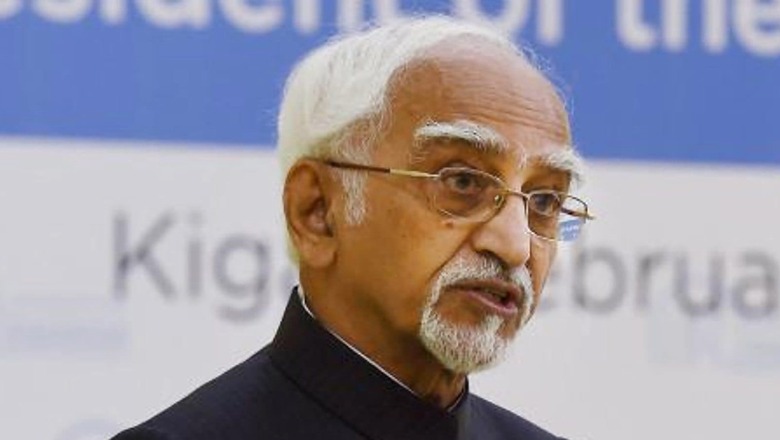
views
Former Vice-President Hamid Ansari lamenting the state of Indian democracy in a discussion on ‘Protecting India’s Pluralist Constitution’ organised by a US-based forum on January 26 was improper on many counts.
The forum was not neutral or broad-based. It was organised primarily by the Indian American Muslim Council (IAMC), which gave the forum and the discussions a clear bias. The intention of the organisers was clearly to fuel more misgivings in American political and civil society circles about a putative growing intolerance towards minorities in India under the Modi government and generate external pressure on it.
In the US, the Democratic Party circles, human rights lobbies and the liberal press have already been targeting India on minority issues, be it the Citizenship Amendment Act, the National Register of Citizens, the Delhi riots, the Shaheen Bagh protest, and so on. For the IAMC, January 26 was a good occasion, not to celebrate India’s Republic Day but to stigmatise it.
It seemed ironic that while all the communities in the country were celebrating the Republic Day in all corners of India, even in Jammu and Kashmir, where the Indian Tricolour was raised in Lal Chowk after 30 years by local Muslims, the former Vice-President was trashing Indian democracy on a forum outside the country organised by a particular religious community.
The discussion in the US was deliberately timed on January 26 for effect, and to provoke, and Shri Ansari, knowing this intention of the organisers still chose to take part. It would not have escaped his attention that the forum was a highly partisan one, deeply anti-Indian in orientation. The list of participants testifies to this.
The four US political leaders who took part — one Senator and three Congressmen — are known critics of Indian democracy on minority issues under the present government; Amnesty International (AI) which has long targeted India on human rights issues and has no credibility in India; the head of the US Commission on International Religious Freedoms (USCIRF) that is in a running feud with the Indian government on the warped positions it takes on curtailment of religious freedoms on India; Genocide Watch (as if genocide has become an issue in India); 21 Wilberforce whose agenda is to challenge religious repression globally etc. A surprising participation was that of Ameenah Gurib-Fakim, a former President of Mauritius, who said absurdly that the Indian Constitution was “being trampled upon almost on a daily basis.” Given the closeness of our ties with Mauritius, this uncalled for interference in our internal politics is crossing a line.
Normally, any responsible person would look carefully at the credentials of the organisers and the other participants to avoid getting embroiled in a controversy if the concerned platform is used to make statements that are extreme and make other participants guilty by association. The reported statements made on the occasion by the participants are full of misinformation, malevolence and bile. That Shri Ansari chose to join such a motley group of India-baiters on January 26 is unfortunate.
The IAMC itself is a suspect organisation. It was established in 2002, apparently after the Gujarat riots. Its founder Sheikh Ubaid has suspect links with Pakistan and the ISI. This should not be surprising. The ISI would always try to penetrate such Muslim organisations abroad with Indian links with a view to exploiting elements in it to further precisely the kind of propaganda that has come out from this conference, one of tarnishing India’s image as a secular democracy and undercutting it politically in the US to highlight issues on which the Democrats raise concerns. The Indian Muslim communities abroad commingle with Pakistani Muslims in mosques and this provides the ISI the opportunity to further its agenda through collaborators they can recruit.
Shri Ansari’s own comments at the conference are too sweeping. He knows the complexity of the India’s past, the communal fissures that have marred its political landscape since 1947. The controversy over the use of “secularism” to pursue “appeasement” politics, the deepening of identity politics in India by all communities, the non-secular positions that the conservative Muslim leadership takes on issues of national sensitivity, the resistance to reform in the community and the links of elements in it to terrorism are a reality. The huge influx of illegal Muslim migrants into India from Bangladesh, including Rohingyas, and the demographic changes that have occurred in Indian states bordering Bangladesh is an issue that has political consequences for our democratic polity. The debate over the persecution and steady elimination of minorities from India’s neighbouring countries, and the decision under the Citizenship Amendment Act to accelerate their access to citizenship within defined limits, has been distorted to political ends and given an international dimension by interested Muslim and Muslim-oriented lobbies when it is India’s internal affair.
Western ideas of nationalism and versions of it are bandied around for scoring political points domestically and internationally without regard to their application to Indian realities. With its huge religious, cultural, linguistic and ethnic diversity, and a federal structure, “nationalism” in the western sense India is under-developed. It needs strengthening so that it remains a dominant force under which differences that arise in this vast country of 1.3 billion can be subsumed.
Shri Ansari speaks of “civic nationalism”. What exactly is that in Indian conditions? Civic nationalism in western discourse is one that is opposed to ethnic nationalism. If the Constitution is the source of civic nationalism, as is suggested, there are elements in the Muslim community that are opposed to a uniform civil code, the grant of rights to Muslim women (Triple Talaq, for instance) in accordance with the rights and freedoms guaranteed by the Constitution. Civic nationalism should normally exclude any claim to special minority rights. Is the right to convert compatible with civic nationalism? Why should the Hindus alone be the upholders of civic nationalism?
As regards to “ethnic nationalism” that is opposed to civic nationalism, such nationalism is alive in India and finds strong expression in politics. What do the regional parties in India represent? “National” parties in several states, for example, have little local hold.
Where does pan-nationalism stand with regard to civic nationalism? Are the two compatible? Does the Muslim community in India reject such nationalism? This is a pertinent question when accusations of “cultural nationalism” are made.
Calling cultural nationalism “imaginary” suggests that the Hindus are claiming an imaginary cultural legacy. It also raises the question about how much American nationalism is fed by what the Americans believe is the superiority of their world-dominating culture. Western Europeans today see their national identity expressed in their superior cultural values. Why is 80% of the country’s population not entitled to explore its cultural roots more deeply and assert its cultural identity, especially when, over the years, the Muslims are increasingly and visibly asserting their distinguishing cultural identity, not the least because of influences from West Asia. Where does one place the practice of street prayers in the scope of cultural or civic nationalism?
To say that “intolerance is being fuelled and an atmosphere of insecurity is being created in the country” suggests that the constitutional processes and law and order are breaking down. That Muslims are feeling beleaguered even when some of their leaders are combative and the Muslim vote has inflicted a political defeat to the BJP in West Bengal, for instance. The fact that it is said and believed that the Muslims will not vote for the BJP and oust it where they can by supporting parties opposed to the BJP (they too are “Hindu” in terms of the majority of their voters) shows some sense of confidence in the community that they are players in the political system.
To say if in a fair and legitimate electoral process a particular party wins a majority it is somehow illegitimate doesn’t make sense. This seems to be the meaning of Shri Ansari’s observation that currently in India an electoral majority is taking the guise of a religious majority. Does this mean that the BJP is cheating its electorate and pursuing policies outside its mandate and manifesto? “It wants to distinguish citizens on the basis of faith”, it is said, without stating what rights of the Muslim citizens have been withdrawn or negated. “It wants to distinguish citizens on the basis of faith, give vent to intolerance, insinuate otherness, and promote disquiet and insecurity. Some of its recent manifestations are chilling and reflect poorly on our claim of being governed by rule of law, says Shri Ansari. This is really hyperbole, with some undesirable symptoms here and there being projected as a serious corporal malady.
This is not to say everything is all right in our society and political system. There are instances of intolerance involving both the majority and minorities. To claim that all minorities are model citizens, believe in secularism, don’t engage in violence, are only innocent victims of it, that extremism and radicalism do not exist in their ranks would be absurd. There is merit in the argument that a higher burden rests on the majority to build a strong and united India and be sensitive to the legitimate concerns of minorities. Excesses from any side should be dealt with a heavy hand to maintain social peace. But one-sided sense of righteousness and propaganda on foreign sectarian platforms should be eschewed. Our problems have to be resolved internally. The IAMC, AI, USCIRF and US politicians won’t solve them for us — they will only worsen them.
The Ministry of External Affairs (MEA) has been forced to take adverse note of this conference. It is ironical that the MEA is implicitly disowning and reprimanding someone who belonged to the Indian Foreign Service and held top diplomatic posts, including PR to the UN at New York. Shri Ansari knows from his own diplomatic career how international propaganda — to which he has contributed — damages our image and interests. The MEA has pointed out to the track record of organisers and the well-known bias and political interests of participants. It has pointed out at the same time that India is a vibrant democracy, does not require certification from others, and that the claim that others need to protect the Indian Constitution is presumptuous and preposterous.
Kanwal Sibal is the former Indian Foreign Secretary. He was India’s Ambassador to Turkey, Egypt, France and Russia. The views expressed in this article are those of the author and do not represent the stand of this publication.
Read all the Latest Opinions here


















Comments
0 comment